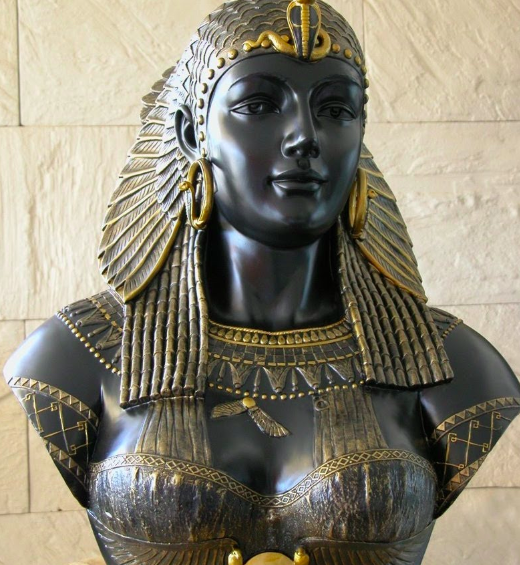her name means the lover of her father
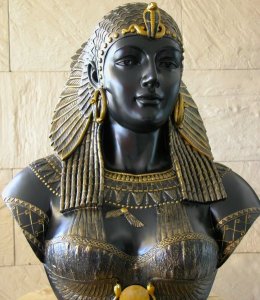
Cleopatra VII “her name means the lover of her father” (69-30 BC)
Born in 69 BC, she was the daughter of Ptolemy XII Auletes. Upon her father’s death, he left an unusual will stating that his eldest son (Ptolemy XIII) and eldest daughter (Cleopatra VII) would rule together. He designated Rome as the guardian of the throne, which is why, as previously mentioned, when the siblings disagreed, they turned to Rome to enforce their father’s will. As mentioned earlier, during the war, when Julius Caesar came to Egypt, Cleopatra seduced him, and he fell in love with her, helping her to rule alone in 48 BC. She initially went with Julius Caesar to Rome and, with her intelligence, sought to rule both Egypt and Rome. This angered the Roman Senate, who turned against Julius Caesar and assassinated him. Cleopatra VII fled back to Egypt, accompanied by her lover, Mark Antony, a Roman general, and they ruled Egypt together. Queen Cleopatra VII was exceptionally intelligent, ambitious, and cultured. As we mentioned, she cleverly charmed Julius Caesar. Her ambition extended to becoming queen of Rome. Her high level of education was evident in her ability to speak seven languages. She even learned ancient Egyptian hieroglyphics. Consequently, she had scholars invent various ointments and perfumes for her. Moreover, she bathed in milk. Galen, the ‘father of medicine’ among the Romans, noted that some of these ointments were effective in treating male baldness And among the most famous things associated with her is what is known as Cleopatra’s Bath. Additionally, among the most famous depictions of the queen is her image on the back wall of the Temple of Edfu, as well as her portrait on the Temple of Dendera
The End of Cleopatra VII’s Reign
During Julius Caesar’s rule and his marriage to Cleopatra, they had a son named Ptolemy XV, whom the Romans mockingly called Caesarion (little Caesar). Julius Caesar granted both Cleopatra and Caesarion some Roman territories, which angered the Roman Senate. Roman commanders, most notably Octavian and his brother-in-law Mark Antony, assassinated Julius Caesar. After Caesar’s death in 44 BC, Mark Antony fell in love with Cleopatra and fled with her to Egypt. They settled in Egypt, married, and had children, which angered his former ally Octavian (as Roman law prohibited bigamy). Antony left his wife, Octavian’s sister, Octavia. Octavian and the Roman commanders were also angered by Cleopatra’s ambitions and Caesar’s earlier gift of Roman territories to her and Caesarion. Mark Antony and his wife Cleopatra ruled from Alexandria, governing Egypt and parts of the Roman Empire. This provoked Octavian to declare war on them in Alexandria. During the war, Mark Antony was killed at the Battle of Actium, causing Cleopatra to fear that Octavian would capture her and parade her through Rome in chains as was customary for Roman triumphs. To avoid this fate, she chose to commit suicide by the bite of a venomous snake. Octavian exacted revenge on both Cleopatra and her husband, killing all their children in 30 BC. Egypt officially came under Roman rule, marking the beginning of the Roman era in Egypt, which lasted from 30 BC to 642 AD.”
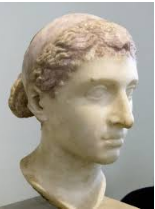
Royal bust of Cleopatra VII in Parian marble, Alexandria Library Museum
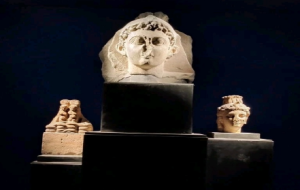
Head of a statue of Marcus Antony and Cleopatra VII and their sons Cleopatra Cellini and Alexander Hellos – Greco-Roman Museum in Alexandria
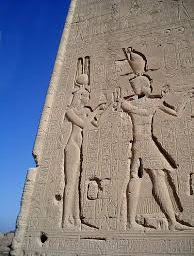
Inscription of Queen Cleopatra VII and her son Caesarion (Ptolemy XIV) on the walls of the temple of Dendera

